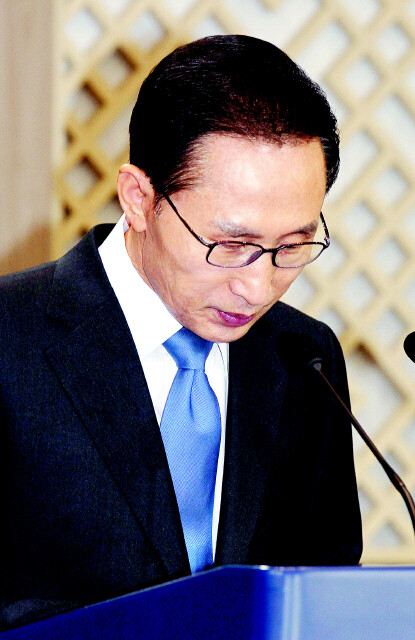hankyoreh
Links to other country sites 다른 나라 사이트 링크
Lee expresses humility and hardline response in address

By Hwang Joon-bum
President Lee Myung-bak’s address Monday is being summarized as consisting mainly of “humility toward the people of South Korea” and an “ultra-hardline response to North Korea.” Analysts say it shows the president’s perception of the current crisis facing him and its solution following the North Korean artillery attack on Yeonpyeong Island.
Although even North Korea acknowledged the attack to be a “provocation,” President Lee has faced harsh criticism domestically. Surveys show that more than 70 percent of South Koreans, conservative and progressive alike, feel that the military and Lee Myung-bak administration did not respond appropriately at the time of the attack. The fact that the president began his address Monday with what amounted to an apology to the people of South Korea reflected a consideration of this situation.
In the course of three sentences at the beginning of his address, President Lee used the terms “sense of responsibility,” “the disappointment of all South Koreans,” and “feelings of regret and unworthiness.”
“The president did everything but use the actual word ‘apology,’” said a core Cheong Wa Dae (the presidential office in South Korea or Blue House) official. “It was an apology for all intents and purposes.”
President Lee also reportedly accepted advisers’ suggestions to “express an apology” without indicating any aversion to doing so.
A Cheong Wa Dae official said, “One of the main goals of this address was to allay the anger felt by South Koreans.”
In his address, the president clearly indicated that there is no choice but to respond with stronger sanctions against North Korea.
In particular, he said, “We have now seen that it is impossible to expect North Korea to abandon its military adventurism and nuclear program.” Analysts are taking this as indicating the conclusion that any further dialogue or negotiations with Pyongyang are meaningless.
His expressions also lend themselves to the interpretation that Seoul is envisioning the extreme scenario of a unification-by-absorption or a North Korean regime collapse, although the Cheong Wa Dae has denied this. In his May 24 address following the Cheonan sinking, President Lee referred to the “stability and peace of the Korean Peninsula” and left room for the possibility of dialogue, saying, “The North Korean regime needs to change now.” However, the words “peace” and “dialogue” were not mentioned in Monday’s address.
President Lee went on to say, “It is time now to show through action rather than words.”
However, the address made no specific reference to what type of action would take place in the future, a significant omission since a number of analysts say all the remaining options involving a physical response are not in South Korea’s interests. In its measures on May 24, the Lee administration used up all available means of punishing North Korea, including halting trade and interchange between North Korea and South Korea, blocking the passage of North Korean vessels through South Korean waters, resuming psychological warfare tactics such as the distribution of propaganda fliers, and referring the matter to the United Nations Security Council. The only remain option, the full closure of the Kaesong Industrial Complex, appears unlikely, since it would be difficult to restore at a later date and could have the effect of leading to Pyongyang’s incorporation into the Chinese economic sphere.
Observers say President Lee appears likely to focus on stepping up defense reforms and military power in the five West Sea islands region domestically, while putting off the resumption of the six-party talks and urging the United States, China, and Japan to participate in efforts to pressure Pyongyang.
Please direct questions or comments to [englishhani@hani.co.kr]
Editorial・opinion
![[Guest essay] The real reason Korea’s new right wants to dub Rhee a founding father [Guest essay] The real reason Korea’s new right wants to dub Rhee a founding father](https://flexible.img.hani.co.kr/flexible/normal/500/300/imgdb/original/2024/0423/8317138574257878.jpg) [Guest essay] The real reason Korea’s new right wants to dub Rhee a founding father
[Guest essay] The real reason Korea’s new right wants to dub Rhee a founding father![[Column] ‘Choson’: Is it time we start referring to N. Korea in its own terms? [Column] ‘Choson’: Is it time we start referring to N. Korea in its own terms?](https://flexible.img.hani.co.kr/flexible/normal/500/300/imgdb/original/2024/0423/3617138579390322.jpg) [Column] ‘Choson’: Is it time we start referring to N. Korea in its own terms?
[Column] ‘Choson’: Is it time we start referring to N. Korea in its own terms?- [Editorial] Japan’s rewriting of history with Korea has gone too far
- [Column] The president’s questionable capacity for dialogue
- [Column] Are chaebol firms just pizza pies for families to divvy up as they please?
- [Column] Has Korea, too, crossed the Rubicon on China?
- [Correspondent’s column] In Japan’s alliance with US, echoes of its past alliances with UK
- [Editorial] Does Yoon think the Korean public is wrong?
- [Editorial] As it bolsters its alliance with US, Japan must be accountable for past
- [Guest essay] Amending the Constitution is Yoon’s key to leaving office in public’s good graces
Most viewed articles
- 1[Guest essay] The real reason Korea’s new right wants to dub Rhee a founding father
- 2Terry Anderson, AP reporter who informed world of massacre in Gwangju, dies at 76
- 3[Column] ‘Choson’: Is it time we start referring to N. Korea in its own terms?
- 4Why Korea shouldn’t welcome Japan’s newly beefed up defense cooperation with US
- 5Opposition calls Yoon’s chief of staff appointment a ‘slap in the face’
- 6[Column] The clock is ticking for Korea’s first lady
- 7Senior doctors cut hours, prepare to resign as government refuses to scrap medical reform plan
- 8New AI-based translation tools make their way into everyday life in Korea
- 9[Editorial] Japan’s rewriting of history with Korea has gone too far
- 10[Column] Are chaebol firms just pizza pies for families to divvy up as they please?